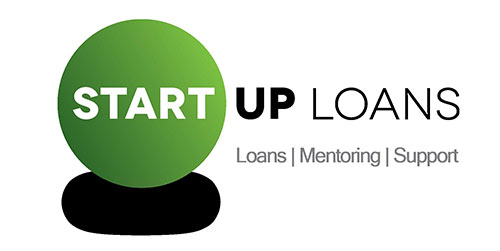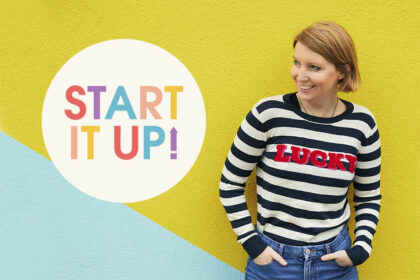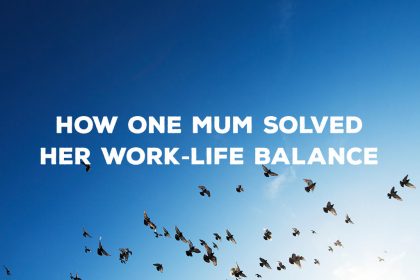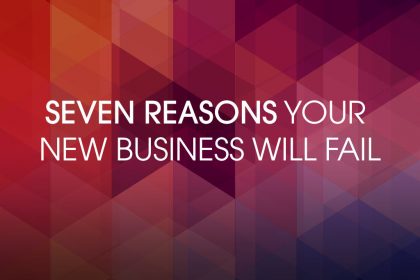Interview with The Apprentice winner Yasmina Siadatan
Got a great business idea but no idea how to finance it? Yasmina Siadatan is winner of The Apprentice in 2009, a mum of two and Creative Director of Start Up Loans.
We asked Yasmina how Start Up Loans can help entrepreneurial mums, her advice for aspiring business mums and what it’s like behind the scenes on The Apprentice!
How long have you been at Start Up Loans, and what does your role involve?
I’ve been here two years. As Creative Director I’m in charge of all the creative communications and marketing for the business, including the website. I love it!
Who is start up loans for and how do they help?
Our loans are for people who can’t access traditional finance options, such as bank loans. They’re for anyone in the UK with a business idea.
How can you apply?
It’s really easy. Just fill in a quick form on our website and we’ll find the most appropriate delivery partner for you. They’ll get in touch with you to help you put together your business plan.
Then you simply submit your plan to us and we’ll consider it for funding. Things your delivery partner will be looking for in helping you with your submission are confidence, a clear business plan, and numbers that stack up.
Once we’ve approved your loan, you’ll receive your money. Often we’ll recommend you use it in specific areas, such as marketing, sales or equipment, but you’re free to spend it where you think it’s needed.
You’ll also be assigned a mentor to help advise and guide you as you grow your business. I think it’s the support coupled with the money that makes the scheme successful.
If you need more guidance, our online Start Up Toolkit also has lots of advice and tools to help guide you through the process of setting up a business.
How much do you lend businesses?
We can lend up to £25,000, but the average loan is around £6,000. The loan is unsecured and it’s repayable over five years at an annual interest rate of 6%.
What type of businesses generally apply for loans?
The four most common types of industries applying for Start Up Loans are fashion and beauty, construction (plumbers, scaffolders etc), the tech sector, and food and drink.
Only 37% of the amount you lend goes to women. Why is the percentage so low?
It’s actually a really positive percentage. Especially when you compare it to the statistics at Companies House, where only 19% of company directors are women.
We don’t have a remit to get to 50/50 – we lend without discrimination to anyone whose business plan meets our criteria. We just get fewer applications from women in the first place.
The fact that our figure is higher than the percentage of female directors registered through Companies House just goes to show how hard it is for female entrepreneurs to get finance elsewhere.
One in three start ups in the UK fail. What makes the other two thirds successful?
I think it depends on the qualities of the people running the business, and whether they have the commitment and wherewithal to see the process through.
When we lend money, a big part of our decision is based on the person applying, as much as their business plan, and whether they have the right character.
Of course there will always be other factors affecting failure that are outside the control of individuals. But even when a business ‘fails’ there are still valuable lessons people can learn – and they can take those skills and learnings back into the job market.
You won The Apprentice in 2009. Why did you apply for the show?
I thought it would be a bit of fun, which it was. But it was also a life-changer.
What’s it like behind the scenes?
The series is filmed over nine weeks, so it’s very intense. You may shoot as many as three one-day tasks within a seven day period.
The scenes where the project manager in the losing team brings two people back to the boardroom are filmed over a day, while the winning team are on their day out. So the only way you get a day off sometimes is if you’re on the losing team but not called into the boardroom!
Why did you think you did so well?
I have a lot of stamina, and sometimes that alone can get you through. Without it, with the intensity of filming you wouldn’t be able to perform after a while.
I’m also able to make decisions quickly and go on gut instinct, which was definitely an advantage in this process.
The tasks were realistic (although the time frames weren’t!) and required genuine business acumen, which again I think gave me an advantage as I was the only contestant who had already run her own business. It also gave me confidence in front of Lord Sugar.
What was Lord Sugar like?
In real life he is exactly like he is on TV – he’s very witty, with a sharp intelligence. He’s a very astute businessman.
Is he genuinely looking for an apprentice or is it just for TV?
Yes he is, and it’s the only way the show can work. He’s not an actor, and if he wasn’t being genuine and authentic you’d be able to see it. He pays close attention to what goes on.
Is the tension on the show realistic too?
Yes it is. It’s also exciting – after you’ve finished a task you have no idea how the other team has done as the film crew keep you completely separate until you’re in the boardroom.
The first time you find out if the other team have done well or made a big mistake is in front of the cameras.
How much did you learn from working for Lord Sugar? And James Caan?
I’ve learned lots – and am still learning. But as inspiring as Lord Sugar and James Caan are, I think there are amazing business people on every corner.
How closely did you work with Lord Sugar?
I was very privileged to work for his company Amscreen Healthcare, which is run by his son, Simon. I worked in Lord Sugar’s executive office and saw him all the time.
What are your future plans?
I don’t have any right now. I love what I do with Start Up Loans and feel very privileged to be able to help people transform their lives.
Do you think shows like The Apprentice are good for business generally?
I think they’re beneficial because they spark up a conversation between people who may not talk about business otherwise.
I think The Apprentice has also helped to inspire young people to be entrepreneurs. However, it isn’t an accurate representation of what business is really like.
Your children are aged two and three. What’s it like being a working mum?
I love it, and feel privileged to be a mum and work. I have a great network of people around me, and we all make it happen together. It’s a real team effort.
It also helps to have an understanding employer and a role that’s flexible around kids.
What advice do you have for mums thinking of starting a business?
Just go for it! I’ve seen so many women procrastinate – they decide to put off starting a business until their children start school, for example. But there’s never going to be a right time. There’s always going to need to be compromises.
Being an entrepreneur isn’t always the flexible option you think it’s going to be. If you run a business it’s full time and you’ll need childcare. So be practical about it, sort out your childcare and just go for it.
And if you do need finance for your business, come and speak to us. Many of the businesses we have lent money to are started by returning mothers. We’ll guide you through the process, and you can borrow money without it affecting your current financial status.
You can find out more about Start Up Loans on their website.











